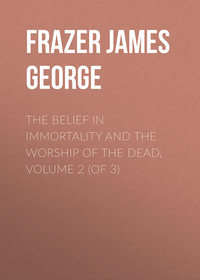 полная версия
полная версияThe Golden Bough: A Study in Magic and Religion (Third Edition, Vol. 03 of 12)
Danger to a person of letting his shadow fall on certain things. Animals and trees also may be injured through their shadows.
In the Banks Islands, Melanesia, there are certain stones of a remarkably long shape which go by the name of tamate gangan or “eating ghosts,” because certain powerful and dangerous ghosts are believed to lodge in them. If a man's shadow falls on one of these stones, the ghost will draw his soul out from him, so that he will die. Such stones, therefore, are set in a house to guard it; and a messenger sent to a house by the absent owner will call out the name of the sender, lest the watchful ghost in the stone should fancy that he came with evil intent and should do him a mischief.257 In Florida, one of the Solomon Islands, there are places sacred to ghosts, some in the village, some in the gardens, and some in the bush. No man would pass one of these places when the sun was so low as to cast his shadow into it, for then the ghost would draw it from him.258 The Indian tribes of the Lower Fraser River believe that man has four souls, of which the shadow is one, though not the principal, and that sickness is caused by the absence of one of the souls. Hence no one will let his shadow fall on a sick shaman, lest the latter should purloin it to replace his own lost soul.259 At a funeral in China, when the lid is about to be placed on the coffin, most of the bystanders, with the exception of the nearest kin, retire a few steps or even retreat to another room, for a person's health is believed to be endangered by allowing his shadow to be enclosed in a coffin. And when the coffin is about to be lowered into the grave most of the spectators recoil to a little distance lest their shadows should fall into the grave and harm should thus be done to their persons. The geomancer and his assistants stand on the side of the grave which is turned away from the sun; and the grave-diggers and coffin-bearers attach their shadows firmly to their persons by tying a strip of cloth tightly round their waists.260 In the Nicobar Islands burial usually takes place at sundown, before midnight, or at early dawn. In no case can an interment be carried out at noon or within an hour of it, lest the shadows of the bearers who lower the body into the earth, or of the mourners taking their last look at the shrouded figure, should fall into the grave; for that would cause them to be sick or die. And when the dead has been laid in his last home, but before the earth is shovelled in upon him, the leaves of a certain jungle tree are waved over the grave, and a lighted torch is brandished inside it, to disperse any souls of the sorrowing bystanders that may be lingering with their departed friend in his narrow bed. Then the signal is given, and the earth or sand is rapidly shovelled in by a party of young men who have been standing in readiness to perform the duty.261 When the Malays are building a house, and the central post is being set up, the greatest precautions are taken to prevent the shadow of any of the workers from falling either on the post or on the hole dug to receive it; for otherwise they think that sickness and trouble will be sure to follow.262 When members of some Victorian tribes were performing magical ceremonies for the purpose of bringing disease and misfortune on their enemies, they took care not to let their shadows fall on the object by which the evil influence was supposed to be wafted to the foe.263 In Darfur people think that they can do an enemy to death by burying a certain root in the earth on the spot where the shadow of his head happens to fall. The man whose shadow is thus tampered with loses consciousness at once and will die if the proper antidote be not administered. In like manner they can paralyse any limb, as a hand or leg, by planting a particular root in the earth in the shadow of the limb they desire to maim.264 Nor is it human beings alone who are thus liable to be injured by means of their shadows. Animals are to some extent in the same predicament. A small snail, which frequents the neighbourhood of the limestone hills in Perak, is believed to suck the blood of cattle through their shadows; hence the beasts grow lean and sometimes die from loss of blood.265 The ancients supposed that in Arabia, if a hyæna trod on a man's shadow, it deprived him of the power of speech and motion; and that if a dog, standing on a roof in the moonlight, cast a shadow on the ground and a hyæna trod on it, the dog would fall down as if dragged with a rope.266 Clearly in these cases the shadow, if not equivalent to the soul, is at least regarded as a living part of the man or the animal, so that injury done to the shadow is felt by the person or animal as if it were done to his body. Even the shadows of trees are supposed by the Caffres to be sensitive. Hence when a Caffre doctor seeks to pluck the leaves of a tree for medicinal purposes, he “takes care to run up quickly, and to avoid touching the shadow lest it should inform the tree of the danger, and so give the tree time to withdraw the medicinal properties from its extremities into the safety of the inaccessible trunk. The shadow of the tree is said to feel the touch of the man's feet.”267
Danger of being overshadowed by certain birds or people.
Conversely, if the shadow is a vital part of a man or an animal, it may under certain circumstances be as hazardous to be touched by it as it would be to come into contact with the person or animal. Thus in the North-West Provinces of India people believe that if the shadow of the goat-sucker bird falls on an ox or a cow, but especially on a cow buffalo, the beast will soon die. The remedy is for some one to kill the bird, rub his hands or a stick in the blood, and then wave the stick over the animal. There are certain men who are noted for their powers in this respect all over the district.268 The Kaitish of central Australia hold that if the shadow of a brown hawk falls on the breast of a woman who is suckling a child, the breast will swell up and burst. Hence if a woman sees one of these birds in these circumstances, she runs away in fear.269 In the Central Provinces of India a pregnant woman avoids the shadow of a man, believing that if it fell on her, the child would take after him in features, though not in character.270 In Shoa any obstinate disorder, for which no remedy is known, such as insanity, epilepsy, delirium, hysteria, and St. Vitus's dance, is traced either to possession by a demon or to the shadow of an enemy which has fallen on the sufferer.271 The Bushman is most careful not to let his shadow fall on the dead game, as he thinks this would bring bad luck.272 Amongst the Caffres to overshadow the king by standing in his presence was an offence worthy of instant death.273 And it is a Caffre superstition that if the shadow of a man who is protected by a certain charm falls on the shadow of a man who is not so protected, the unprotected person will fall down, overcome by the power of the charm which is transmitted through the shadow.274 In the Punjaub some people believe that if the shadow of a pregnant woman fell on a snake, it would blind the creature instantly.275
The shadows of certain persons are regarded as peculiarly dangerous. The savage's dread of his mother in-law.
Hence the savage makes it a rule to shun the shadow of certain persons whom for various reasons he regards as sources of dangerous influence. Amongst the dangerous classes he commonly ranks mourners and women in general, but especially his mother-in-law. The Shuswap Indians of British Columbia think that the shadow of a mourner falling upon a person would make him sick.276 Amongst the Kurnai tribe of Victoria novices at initiation were cautioned not to let a woman's shadow fall across them, as this would make them thin, lazy, and stupid.277 An Australian native is said to have once nearly died of fright because the shadow of his mother-in-law fell on his legs as he lay asleep under a tree.278 The awe and dread with which the untutored savage contemplates his mother-in-law are amongst the most familiar facts of anthropology. In the Yuin tribes of New South Wales the rule which forbade a man to hold any communication with his wife's mother was very strict. He might not look at her or even in her direction. It was a ground of divorce if his shadow happened to fall on his mother-in-law: in that case he had to leave his wife, and she returned to her parents.279 In the Hunter River tribes of New South Wales it was formerly death for a man to speak to his mother-in-law; however, in later times the wretch who had committed this heinous crime was suffered to live, but he was severely reprimanded and banished for a time from the camp.280 In the Kulin tribe it was thought that if a woman looked at or spoke to her son-in-law or even his brother, her hair would turn white. The same result, it was supposed, would follow if she ate of game which had been presented to her husband by her son-in-law; but she could obviate this ill consequence by blackening her face, and especially her mouth, with charcoal, for then her hair would not turn white.281 Similarly in the Kurnai tribe of Victoria a woman is not permitted to see her daughter's husband in camp or elsewhere. When he is present, she keeps her head covered with an opossum rug. The camp of the mother-in-law faces in a different direction to that of her son-in-law. A screen of high bushes is erected between both huts, so that no one can see over from either. When the mother-in-law goes for firewood, she crouches down as she goes out or in, with her head covered.282 In Uganda a man may not see his mother-in-law nor speak to her face to face. Should they meet by accident, she must turn aside and cover her head with her clothes; or if her garments are too scanty for that, she may squat on her haunches and hide her face in her hands. If he wishes to hold any communication with her, it must be done through a third person, or through a wall or closed door. Were he to break these rules, he would certainly be seized with a shaking of the hands and general debility.283 Among some tribes of eastern Africa which formerly acknowledged the suzerainty of the sultan of Zanzibar, before a young couple had children they might meet neither their father-in-law nor their mother-in-law. To avoid them they must take a long roundabout. But if they could not do that, they must throw themselves on the ground and hide their faces till the father-in-law or mother-in-law had passed by.284 Among the Basutos a man may never meet his wife's mother, nor speak to her, nor see her. If his wife is ill and her mother comes to nurse her, he must flee the house so long as she is in it; sentinels are posted to warn him of her departure.285 In New Britain the native imagination fails to conceive the extent and nature of the calamities which would result from a man's accidentally speaking to his wife's mother; suicide of one or both would probably be the only course open to them. The most solemn form of oath a New Briton can take is, “Sir, if I am not telling the truth, I hope I may shake hands with my mother-in-law.”286 At Vanua Lava in the Banks Islands, a man would not so much as follow his mother-in-law along the beach until the rising tide had washed out her footprints in the sand.287 To avoid meeting his mother-in-law face to face a very desperate Apache Indian, one of the bravest of the brave, has been seen to clamber along the brink of a precipice at the risk of his life, hanging on to rocks from which had he fallen he would have been dashed to pieces or at least have broken several of his limbs.288 Still more curious and difficult to explain is the rule which forbids certain African kings, after the coronation ceremonies have been completed, ever to see their own mothers again. This restriction was imposed on the kings of Benin and Uganda. Yet the queen-mothers lived in regal state with a court and lands of their own. In Uganda it was thought that if the king were to see his mother again, some evil and probably death would surely befall him.289
A man's health and strength supposed to vary with the length of his shadow. Fear of the loss of the shadow. Fear of the resemblance of a child to its parents.
Where the shadow is regarded as so intimately bound up with the life of the man that its loss entails debility or death, it is natural to expect that its diminution should be regarded with solicitude and apprehension, as betokening a corresponding decrease in the vital energy of its owner. An elegant Greek rhetorician has compared the man who lives only for fame to one who should set all his heart on his shadow, puffed up and boastful when it lengthened, sad and dejected when it shortened, wasting and pining away when it dwindled to nothing. The spirits of such an one, he goes on, would necessarily be volatile, since they must rise or fall with every passing hour of the day. In the morning, when the level sun, just risen above the eastern horizon, stretched out his shadow to enormous length, rivalling the shadows cast by the cypresses and the towers on the city wall, how blithe and exultant would he be, fancying that in stature he had become a match for the fabled giants of old; with what a lofty port he would then strut and shew himself in the streets and the market-place and wherever men congregated, that he might be seen and admired of all. But as the day wore on, his countenance would change and he would slink back crestfallen to his house. At noon, when his once towering shadow had shrunk to his feet, he would shut himself up and refuse to stir abroad, ashamed to look his fellow-townsmen in the face; but in the afternoon his drooping spirits would revive, and as the day declined his joy and pride would swell again with the length of the evening shadows.290 The rhetorician who thus sought to expose the vanity of fame as an object of human ambition by likening it to an ever-changing shadow, little dreamed that in real life there were men who set almost as much store by their shadows as the fool whom he had conjured up in his imagination to point a moral. So hard is it for the straining wings of fancy to outstrip the folly of mankind. In Amboyna and Uliase, two islands near the equator, where necessarily there is little or no shadow cast at noon, the people make it a rule not to go out of the house at mid-day, because they fancy that by doing so a man may lose the shadow of his soul.291 The Mangaians tell of a mighty warrior, Tukaitawa, whose strength waxed and waned with the length of his shadow. In the morning, when his shadow fell longest, his strength was greatest; but as the shadow shortened towards noon his strength ebbed with it, till exactly at noon it reached its lowest point; then, as the shadow stretched out in the afternoon, his strength returned. A certain hero discovered the secret of Tukaitawa's strength and slew him at noon.292 The savage Besisis of the Malay Peninsula fear to bury their dead at noon, because they fancy that the shortness of their shadows at that hour would sympathetically shorten their own lives.293 The Baganda of central Africa used to judge of a man's health by the length of his shadow. They said, “So-and-so is going to die, his shadow is very small”; or, “He is in good health, his shadow is large.”294 Similarly the Caffres of South Africa think that a man's shadow grows very small or vanishes at death. When her husband is away at the wars, a woman hangs up his sleeping-mat; if the shadow grows less, she says her husband is killed; if it remains unchanged, she says he is unscathed.295 It is possible that even in lands outside the tropics the observation of the diminished shadow at noon may have contributed, even if it did not give rise, to the superstitious dread with which that hour has been viewed by many peoples, as by the Greeks, ancient and modern, the Bretons, the Russians, the Roumanians of Transylvania, and the Indians of Santiago Tepehuacan.296 In this observation, too, we may perhaps detect the reason why noon was chosen by the Greeks as the hour for sacrificing to the shadowless dead.297 The loss of the shadow, real or apparent, has often been regarded as a cause or precursor of death. Whoever entered the sanctuary of Zeus on Mount Lycaeus in Arcadia was believed to lose his shadow and to die within the year.298 In Lower Austria on the evening of St. Sylvester's day – the last day of the year – the company seated round the table mark whose shadow is not cast on the wall, and believe that the seemingly shadowless person will die next year. Similar presages are drawn in Germany both on St. Sylvester's day and on Christmas Eve.299 The Galelareese fancy that if a child resembles his father, they will not both live long; for the child has taken away his father's likeness or shadow, and consequently the father must soon die.300 Similarly among some tribes of the Lower Congo, “if the child is like its mother, father, or uncle, they think it has the spirit of the person it resembles, and that that person will soon die. Hence a parent will resent it if you say that the baby is like him or her.”301
The shadows of people built into foundations to strengthen the edifices.
Nowhere, perhaps, does the equivalence of the shadow to the life or soul come out more clearly than in some customs practised to this day in south-eastern Europe. In modern Greece, when the foundation of a new building is being laid, it is the custom to kill a cock, a ram, or a lamb, and to let its blood flow on the foundation-stone, under which the animal is afterwards buried. The object of the sacrifice is to give strength and stability to the building. But sometimes, instead of killing an animal, the builder entices a man to the foundation-stone, secretly measures his body, or a part of it, or his shadow, and buries the measure under the foundation-stone; or he lays the foundation-stone upon the man's shadow. It is believed that the man will die within the year.302 In the island of Lesbos it is deemed enough if the builder merely casts a stone at the shadow of a passer-by; the man whose shadow is thus struck will die, but the building will be solid.303 A Bulgarian mason measures the shadow of a man with a string, places the string in a box, and then builds the box into the wall of the edifice. Within forty days thereafter the man whose shadow was measured will be dead and his soul will be in the box beside the string; but often it will come forth and appear in its former shape to persons who were born on a Saturday. If a Bulgarian builder cannot obtain a human shadow for this purpose, he will content himself with measuring the shadow of the first animal that comes that way.304 The Roumanians of Transylvania think that he whose shadow is thus immured will die within forty days; so persons passing by a building which is in course of erection may hear a warning cry, “Beware lest they take thy shadow!” Not long ago there were still shadow-traders whose business it was to provide architects with the shadows necessary for securing their walls.305 In these cases the measure of the shadow is looked on as equivalent to the shadow itself, and to bury it is to bury the life or soul of the man, who, deprived of it, must die. Thus the custom is a substitute for the old practice of immuring a living person in the walls, or crushing him under the foundation-stone of a new building, in order to give strength and durability to the structure, or more definitely in order that the angry ghost may haunt the place and guard it against the intrusion of enemies. Thus when a new gate was made or an old gate was repaired in the walls of Bangkok, it used to be customary to crush three men to death under an enormous beam in a pit at the gateway. Before they were led to their doom, they were regaled at a splendid banquet; the whole court came to salute them; and the king himself charged them straitly to guard well the gate that was to be committed to their care, and to warn him if enemies or rebels came to assault the city. The next moment the ropes were cut and the beam descended on them. The Siamese believed that these unfortunates were transformed into the genii which they called phi.306 It is said that when the massive teak posts of the gateways of Mandalay were set up, a man was bound and placed under each post and crushed to death. The Burmese believe that men who die a violent death turn into nats or demons and haunt the spot where they were killed, doing a mischief to such as attempt to molest the place. Thus their spirits become guardians of the gates.307 This theory would explain why such sacrifices appear to be offered most commonly at thoroughfares, such as gates and bridges, where ghostly warders may be deemed especially serviceable in keeping; watch on the multitudes that go to and fro.308 In Bima, a district of the East Indian island of Sambawa, the custom is marked by some peculiar features, which deserve to be mentioned. When a new flag-pole is set up at the sultan's palace a woman is crushed to death under it; but she must be pregnant. If the destined victim should be brought to bed before her execution, she goes free. The notion may be that the ghost of such a woman would be more than usually fierce and vigilant. Again, when the wooden doors are set up at the palace, it is customary to bury a child under each of the door-posts. For these purposes officers are sent to scour the country for a pregnant woman or little children, as the case may be, and if they come back empty-handed they must give up their own wives or children to serve as victims. When the gates are set up, the children are killed, their bodies stript of flesh, and their bones laid in the holes in which the door-posts are erected. Then the flesh is boiled with horse's flesh and served up to the officers. Any officer who refuses to eat of it is at once cut down.309 The intention of this last practice is perhaps to secure the fidelity of the officers by compelling them to enter into a covenant of the most solemn and binding nature with the ghosts of the murdered children who are to guard the gates.
Deification of a measuring tape.
The practice of burying the measure of a man's shadow, as a substitute for the man himself, under the foundation-stone of a building may perhaps throw light on the singular deity whom the people of Kisser, an East Indian island, choose to guard their houses and villages. The god in question is nothing more or less than the measuring-tape which was used to measure the foundations of the house or of the village temple. After it has served this useful purpose, the tape is wound about a stick shaped like a paddle, and is then deposited in the thatch of the roof of the house, where food is offered to it on all special occasions. The deified measuring-tape of the whole village is that which was used to measure the foundations of the first house or of the village temple. The handle of the paddle-like stick on which it is wound is carved into the figure of a person squatting in the usual posture; and the whole is kept in a rough wooden box along with one or two figures to act as its guards.310 It is possible, though perhaps hardly probable, that these tapes may be thought to contain the souls of men whose shadows they measured at the foundation ceremony.
The soul sometimes supposed to be in the reflection. Dangers to which the reflection-soul is exposed.
As some peoples believe a man's soul to be in his shadow, so other (or the same) peoples believe it to be in his reflection in water or a mirror. Thus “the Andamanese do not regard their shadows but their reflections (in any mirror) as their souls.”311 According to one account, some of the Fijians thought that man has two souls, a light one and a dark one; the dark one goes to Hades, the light one is his reflection in water or a mirror.312 When the Motumotu of New Guinea first saw their likenesses in a looking-glass they thought that their reflections were their souls.313 In New Caledonia the old men are of opinion that a person's reflection in water or a mirror is his soul; but the younger men, taught by the Catholic priests, maintain that it is a reflection and nothing more, just like the reflection of palm-trees in the water.314 The reflection-soul, being external to the man, is exposed to much the same dangers as the shadow-soul. Among the Galelareese, half-grown lads and girls may not look at themselves in a mirror; for they say that the mirror takes away their bloom and leaves them ugly.315 And as the shadow may be stabbed, so may the reflection. Hence an Aztec mode of keeping sorcerers from the house was to leave a vessel of water with a knife in it behind the door. When a sorcerer entered he was so much alarmed at seeing his reflection in the water transfixed by a knife that he turned and fled.316 In Corrèze, a district of the Auvergne, a cow's milk had dried up through the maleficent spells of a neighbouring witch, so a sorcerer was called in to help. He made the woman whose cow was bewitched sit in front of a pail of water with a knife in her hand till she thought she saw the image of the witch in the water, whereupon he made her stab the image with the knife. They say that if the knife strikes the image fair in the eye, the person whose likeness it is will suffer a corresponding injury in his or her eye. This procedure, we are informed, has been successful in restoring milk to the udders of a cow when even holy water had been tried in vain.317 The Zulus will not look into a dark pool because they think there is a beast in it which will take away their reflections, so that they die.318 The Basutos say that crocodiles have the power of thus killing a man by dragging his reflection under water. When one of them dies suddenly and from no apparent cause, his relatives will allege that a crocodile must have taken his shadow some time when he crossed a stream.319 In Saddle Island, Melanesia, there is a pool “into which if any one looks he dies; the malignant spirit takes hold upon his life by means of his reflection on the water.”320








